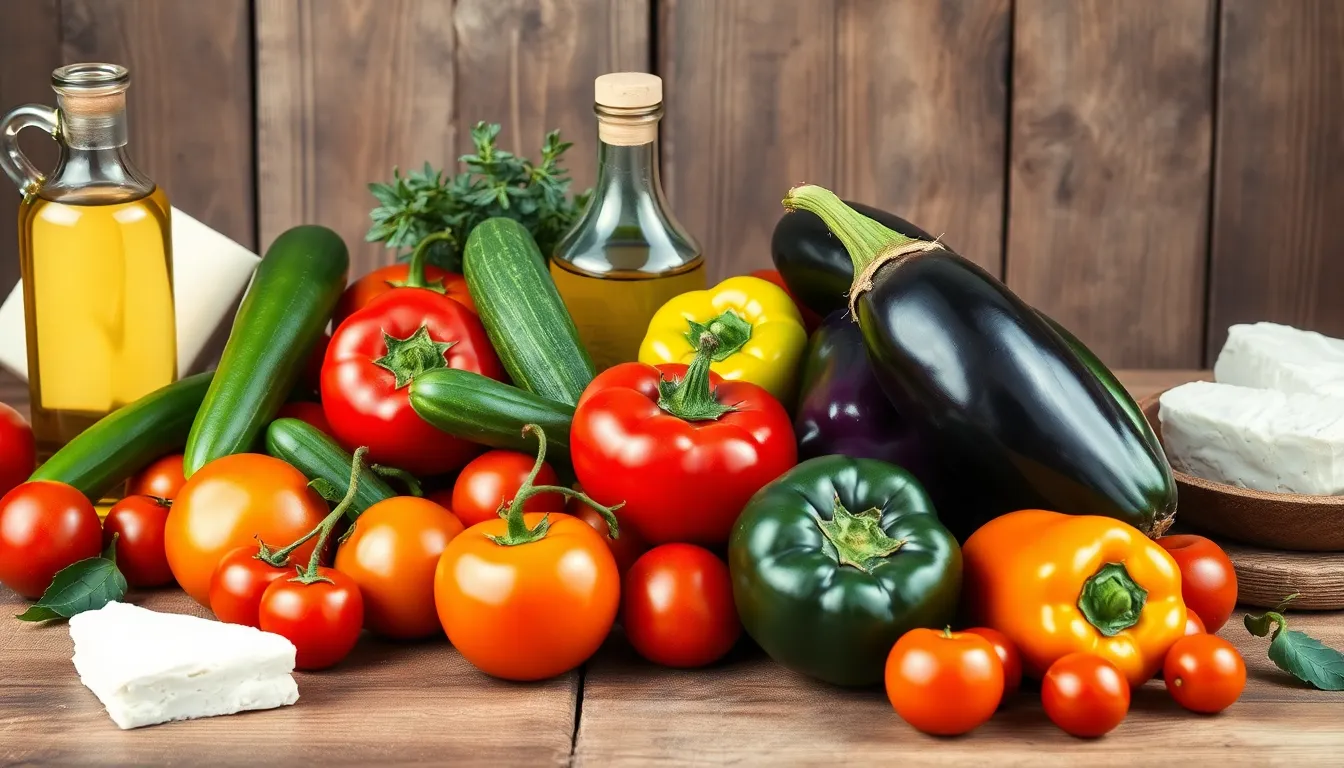Table of Contents
ToggleGreek cuisine offers a vibrant tapestry of flavors and traditions that have evolved over centuries. Rooted in ancient history, it reflects the Mediterranean lifestyle, emphasizing fresh ingredients, bold herbs, and healthy fats. From the sun-kissed shores of the Aegean to the lush hills of Crete, each region boasts its unique culinary treasures.
Dishes like moussaka, souvlaki, and tzatziki not only tantalize the taste buds but also tell stories of the land and its people. With an increasing global interest in healthy eating, Greek cuisine stands out for its emphasis on wholesome ingredients and simple preparation methods. Whether dining at a local taverna or recreating recipes at home, exploring Greek cuisine is a delicious journey into a rich cultural heritage.
Overview Of Greek Cuisine
Greek cuisine encompasses a variety of flavors and techniques shaped by history and geography. It draws heavily from Mediterranean traditions, emphasizing fresh produce, lean proteins, and healthy fats like olive oil.
Key ingredients dominate Greek dishes:
- Olive oil: It’s a staple, often used in dressings and cooking.
- Fresh vegetables: Varieties such as tomatoes, cucumbers, and bell peppers frequently appear in salads and mezze.
- Herbs and spices: Oregano, thyme, bay leaves, and garlic add depth to many recipes.
Signature dishes represent the essence of Greek cooking:
- Moussaka: A layered dish featuring eggplant, minced meat, and béchamel sauce.
- Souvlaki: Skewered and grilled meat served with pita and various sauces.
- Tzatziki: A yogurt-based dip enriched with cucumber and garlic.
Regional diversity showcases variations across Greece. Islands often highlight seafood, while mountainous areas favor hearty meat dishes. This culinary landscape invites exploration, offering unique dining experiences that reflect local traditions and flavors. As global interest in Mediterranean diets continues to grow, Greek cuisine stands out as an exemplary model for health-conscious eating.
Key Ingredients In Greek Cuisine

Greek cuisine relies heavily on fresh, high-quality ingredients that enhance its vibrant flavors. Essential components dictate the character of many traditional dishes.
Fresh Vegetables and Herbs
Fresh vegetables play a crucial role in Greek cuisine. Common selections include tomatoes, cucumbers, eggplants, and bell peppers. These ingredients add color, texture, and nutrition to dishes like Greek salad and ratatouille. Herbs such as oregano, dill, and parsley are foundational, amplifying flavor profiles. The generous use of herbs brings depth to multiple recipes, creating a fragrant culinary experience.
Olive Oil and Feta Cheese
Olive oil stands as a cornerstone of Greek cooking, prized for its health benefits and rich taste. Often used as a dressing, marinade, or cooking fat, it enhances the overall flavor of various meals. Feta cheese, a staple in many Greek dishes, offers a tangy counterpart to the freshness of vegetables. This brined cheese adds creaminess to salads, pastries like spanakopita, and savory pies, solidifying its status in Greek gastronomy.
Popular Dishes In Greek Cuisine
Greek cuisine features several iconic dishes, each reflecting the country’s rich culinary heritage and regional diversity. Here are some of the most popular options that highlight the flavors of Greece.
Moussaka
Moussaka represents a classic Greek dish cherished for its layers of flavor. This baked casserole includes sliced eggplant, spiced ground meat, and a creamy béchamel sauce. Traditional recipes often incorporate aromatic spices like cinnamon and allspice, enhancing the dish’s depth. Moussaka’s preparation varies by region, with some versions including potatoes or zucchini. Its hearty nature makes it a staple at family gatherings and festive occasions.
Souvlaki
Souvlaki features skewered and grilled meat, providing a delightful taste of Greece. Typically made with pork, chicken, or lamb, the meat is marinated in olive oil, lemon juice, and herbs before grilling. It’s common to serve souvlaki with pita bread, fresh vegetables, and a dollop of tzatziki. As a popular street food, souvlaki appeals to locals and tourists alike, offering a quick and satisfying meal.
Tzatziki
Tzatziki serves as a refreshing and tangy yogurt-based sauce that complements many Greek dishes. Made from Greek yogurt, cucumber, garlic, lemon juice, and herbs, tzatziki brings balance to rich foods like moussaka and souvlaki. Its cool, creamy texture pairs perfectly with grilled meats or as a dip for pita and vegetables. Tzatziki’s simplicity allows the flavors of fresh ingredients to shine, making it a must-try in Greek cuisine.
Regional Variations Of Greek Cuisine
Greek cuisine varies significantly across its regions, each presenting unique flavor profiles and dishes that reflect local resources and traditions. Both Cretan and Cycladic cuisines offer distinct culinary experiences influenced by geography and history.
Cretan Cuisine
Cretan cuisine emphasizes fresh, high-quality ingredients sourced from the island’s rich agricultural landscape. Olive oil serves as the primary fat, enhancing dishes such as dakos, a traditional barley rusk topped with tomatoes, feta, and herbs. The use of wild greens, fresh seafood, and local cheeses reflects the island’s Mediterranean setting. Iconic dishes include moussaka, featuring layers of eggplant and ground meat, often spiced with cinnamon. Cretans value the Mediterranean diet, focusing on health benefits while celebrating communal dining experiences with plentiful meze, or small plates.
Cycladic Cuisine
Cycladic cuisine showcases the flavors of the Aegean islands through an abundance of seafood and vegetable-based dishes. Staples include fresh fish, grilled octopus, and a range of local cheeses such as kopanisti, a spicy, spreadable cheese. Santorini, in particular, is renowned for its unique cherry tomatoes and fava, a split pea puree, which highlight the island’s volcanic soil. Cycladic meals often incorporate herbs like capers and oregano, elevating dishes while maintaining simplicity and freshness. The emphasis on seasonal ingredients reflects the islands’ agricultural heritage and robust fishing traditions.
Cultural Significance Of Greek Cuisine
Greek cuisine serves as a vital representation of the country’s rich history and cultural identity. It embodies traditional values, familial ties, and local customs. Food in Greece acts as a unifying force, bringing people together during celebrations, holidays, and communal gatherings.
Greek meals typically follow a meze style, encouraging sharing and social interaction. This custom reflects the importance of hospitality, known as “filoxenia,” which translates to “friend to a stranger.” The practice fosters connections between people, deepening relationships through shared culinary experiences.
Religious influences also shape Greek cuisine. Festivals and religious observances dictate dietary customs. For example, during Lent, many Greeks refrain from consuming meat and animal products, embracing plant-based dishes like fasolada and gigantes. Such practices highlight the intersection of spirituality and gastronomy within the culture.
Regional diversity further enriches Greek cuisine. Various local ingredients and cooking techniques contribute to distinctive flavors across regions. For example, island areas emphasize seafood dishes while mountainous regions highlight meat preparations. This regional variation mirrors the country’s geography and agricultural practices.
Culinary traditions pass through generations, preserving ancestral recipes and techniques. Family gatherings often feature traditional dishes, ensuring cultural heritage remains alive. People often celebrate milestones with significant meals, reinforcing the idea that food connects individuals to their roots.
Greek cuisine functions as a cultural cornerstone, reflecting the nation’s history, values, and social fabric. Through shared meals and regional flavors, it cultivates community bonds and maintains culinary traditions that persist through time.
Greek cuisine stands as a vibrant testament to the country’s rich heritage and culinary artistry. Its emphasis on fresh ingredients and bold flavors not only delights the palate but also promotes a healthy lifestyle. Each dish tells a story of tradition and regional diversity, inviting food lovers to explore its many facets.
The communal aspect of dining in Greece fosters connections among family and friends, making meals a cherished experience. As global interest in healthy eating continues to rise, Greek cuisine’s wholesome offerings position it as a preferred choice for those seeking both flavor and nutrition. Embracing Greek culinary traditions allows individuals to savor the essence of a culture that values hospitality and togetherness.







